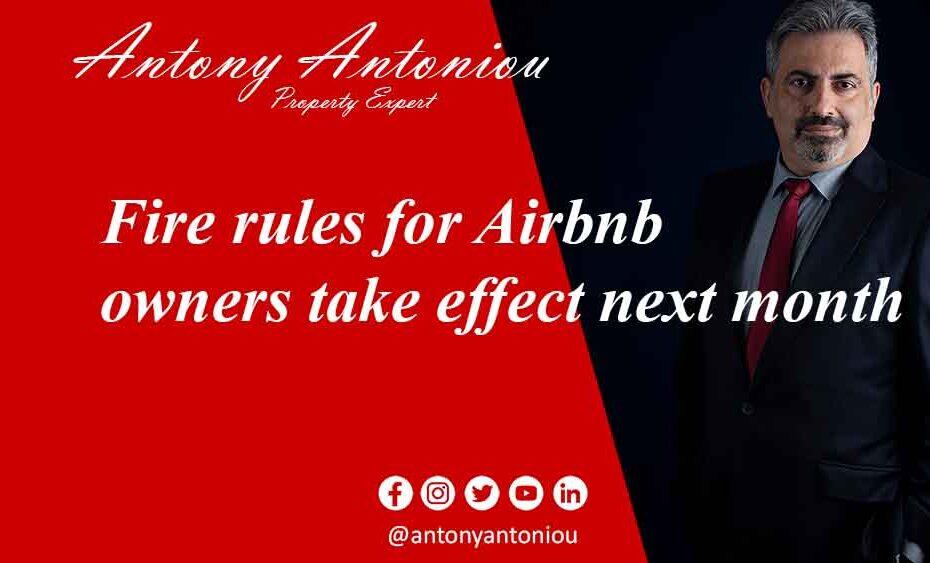Fire rules for Airbnb owners take effect next month
“New Fire Safety Rules for Airbnb Owners: How to Comply and Avoid Fines”
Introduction:
In less than a month, new fire safety regulations will come into effect, impacting Airbnb hosts and other short-term rental property owners across the UK. These regulations are set to ensure the safety of guests and protect against the devastating consequences of fires in rental properties. In this blog post, we’ll break down what these rules mean for you as a property owner, how to comply with them, and the potential consequences of non-compliance.
Understanding the New Regulations:
Starting from October 1st, 2023, property owners who rent out their spaces, even for a single night, will be required to create a written fire safety risk assessment. This assessment aims to identify potential fire hazards, establish escape routes, and ensure the safety of guests. Previously, smaller holiday let businesses were exempt from documenting their fire assessment, but now, all property owners must comply.
Key Fire Safety Measures:
To comply with the new regulations, property owners should take the following fire safety measures:
1. **Means of Escape**: Assess and ensure safe escape routes for guests in case of a fire. Keep these routes clear at all times.
2. **Smoke Detectors**: Install interlinked smoke detectors in all bedrooms, corridors, staircases, dining rooms, and lounges.
3. **Heat Detectors**: Install heat detectors in kitchens.
4. **Fire Doors**: Ensure that escape routes are lined with fire doors, which provide at least 30 minutes of fire resistance. Non-fireproof doors are acceptable for bathrooms, toilets, and cupboards.
5. **Front Door Safety**: Front doors should be self-closing and not require a key to open from the inside.
6. **Alarms**: Smoke detectors and alarms should be connected to the mains electricity supply and equipped with tamper-proof batteries. Test them weekly.
7. **Emergency Lighting**: Provide night lights on staircases or rechargeable torches in guest rooms.
8. **Fire Blankets and Extinguishers**: Place fire blankets and extinguishers near the kitchen.
9. **Furniture Compliance**: Ensure that furniture complies with safety regulations.
10. **Identify Fire Hazards**: Identify potential fire hazards such as smoking, arson, heaters, electrical goods, and kitchens, and take steps to reduce these risks.
Government Guidance:
The Home Office has published a comprehensive guide for small paying-guest accommodation owners, which includes a template for a fire risk assessment. This guide covers the essential elements of fire safety and should be a valuable resource for property owners.
Choosing a Competent Person:
Fire risk assessments must be conducted by a “competent person,” typically the landlord or owner. While specific qualifications are not required, this person should have a deep understanding of relevant legislation, fire safety principles, and an ability to identify and mitigate fire risks. Seeking professional advice is advisable if unsure.
Costs and Record-Keeping:
Fire safety consultations for small holiday lets typically cost between £100 and £200. Property owners should keep records of all inspections and recommendations made by the assessor. For more complex properties, a qualified engineer with experience in fire safety may be required.
Potential Consequences of Non-Compliance:
Failure to comply with the new regulations can result in serious consequences, including property closures, unlimited fines, and up to two years in prison. Property owners should take these regulations seriously to protect both their guests and their businesses.
Conclusion:
As the new fire safety rules for Airbnb owners come into effect, it’s crucial to prioritize the safety of your guests and your property. By following the provided guidelines and conducting a thorough fire risk assessment, you can ensure compliance and peace of mind. Remember, taking these measures isn’t just about ticking boxes; it’s about safeguarding lives and livelihoods.

